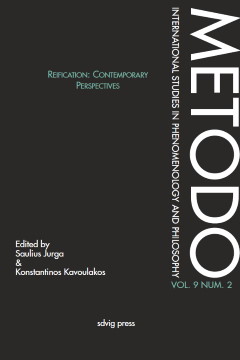Journal | Volume

Reification
Volume 9 (2)
Abstract
A key philosophical theme across traditions including German Idealism, Marxism, critical theory, phenomenology, and existentialism, “reification” (from the Latin res, meaning “thing”) refers to a process whereby phenomena that do not possess thing-like characteristics, such as psyche, consciousness, personhood, personal abilities and capacities, and social relations, are regarded as things. The definition of such thinghood varies among thinkers as diverse as Marx, Simmel, Husserl, Heidegger, Schutz, Lukács, Benjamin, Horkheimer, Adorno, Marcuse, Sartre, Merleau-Ponty, Paci, Gabel, Goldmann, Habermas, Feenberg, and Honneth, depending on their overall theoretical preferences. For some, the res of reification may refer, for example, to natural things, which belong to the realm of objects and are to be explained on the grounds of natural-scientific procedures; for others, thinghood is a result of complex cultural processes, such as historical sedimentations of social relations and practices that eventually acquire a quasi-natural status via conventions, identities, laws, and institutions. More recently, reification has sometimes been conceived in terms of communicative failure, social pathology, misrecognition, disengagement, and cognitive and affective upset, but such approaches to the concept have also attracted criticism for obscuring the social and economic levels of reifying structures. Finally, the phenomenon of reification has been also linked both to the prevalence of formalistic reason in philosophical discourse and the technological domination of nature and society. In this sense, the concept of reification has acquired new relevance in contemporary theoretical debates, resulting in a proliferation of publications unmatched in decades. In this issue of Metodo, authors are invited to interrogate the origin, meaning, and legacy of the concept of reification, as well as to explore the various forms reification assumes in theory and practice.
Notice: Undefined index: onshelf in /home/clients/b010bcc84441ff7c5adbaf4e922effaa/web/mom/module/pub/view-inc.php on line 321
Details | Table of Contents
contemporary perspectives
pp.7-50
https://doi.org/10.19079/metodo.9.2.7revisiting reification in Lukács
pp.51-156
pp.89-120
https://doi.org/10.19079/metodo.9.2.89Will and norm in Lukács, Schmitt, and Kelsen
pp.121-156
https://doi.org/10.19079/metodo.9.2.121defending the Lukácsian critique of reification today
pp.157-240
the lived and the reified
pp.157-170
https://doi.org/10.19079/metodo.9.2.157the critique of reification defended against consumerist and actor-network theories
pp.171-204
https://doi.org/10.19079/metodo.9.2.171from Goldmann to Honneth and Jaeggi
pp.241-326
categories, history and praxis in Lukács and Heidegger
pp.241-272
https://doi.org/10.19079/metodo.9.2.241the "fact of existence" in intersubjective recognition
pp.273-290
https://doi.org/10.19079/metodo.9.2.273pp.291-326
https://doi.org/10.19079/metodo.9.2.291from Hess to Heidegger, Adorno and Sartre
pp.327-416
Azione, reifcazione ed essenza del denaro nella flosofa dell’azione di Moses Hess
pp.327-360
https://doi.org/10.19079/metodo.9.2.327Una aproximación crítica desde Heidegger y Adorno
pp.361-388
https://doi.org/10.19079/metodo.9.2.361Jean-Paul Sartre on reification and massification
pp.389-416
https://doi.org/10.19079/metodo.9.2.361the relevance of reification for social ontology, critical phenomenology, phenomenology of embodiment and philosophy of myth
pp.417-500
towards a phenomenological critique of biocapitalism
pp.447-468
https://doi.org/10.19079/metodo.9.2.447toward a new paradigm of reification
pp.469-500
https://doi.org/10.19079/metodo.9.2.469Publication details
Journal: Metodo
Volume: 9
Issue: 2
Year: 2021
DOI: 10.19079/metodo.9.2
Full citation:
Jurga Saulius, Kavoulakos Konstantinos (2021) Reification. Metodo 9 (2).


